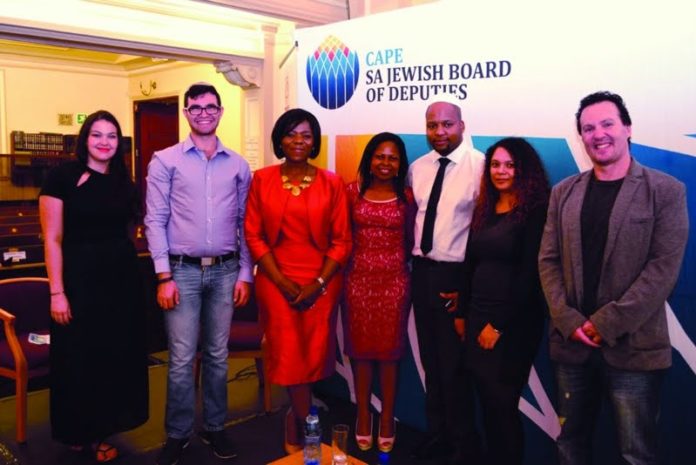 |
In an unprecedented event, the Cape South African Jewish Board of Deputies recently hosted Public Protector Thuli Madonsela and Tony Leon in conversation. Part of the Board’s ‘Straight Talking’ series, this event was entitled ‘Speaking Truth to Power.’
In a Gardens Shul filled with over 500 people, these two leading South Africans spoke about the challenges, successes and aims of the Public Protector’s work in the country today.
While the discussion mainly focussed on national politics, it demonstrated the Jewish community’s commitment to engaging with South African society and its challenges, and the esteem with which it holds figures of authority, like Advocate Madonsela.
Indeed, the South African Jewish Board of Deputies “works for the betterment of human relations in South Africa and debates issues of concern for all South Africans,” said Cape Board Chairman Eric Marx. “We draw inspiration from our Jewish values and traditions to effect social change.”
This was echoed by Gardens Synagogue Rabbi Osher Feldman, who said that the parsha of the week in fact dealt with accountability, describing how Moses ensured that a record was kept of all the precious metals used to build the Mishkan. “Stories like these demonstrate how Judaism expects every person in power to behave beyond reproach,” he explained.
These ideas were emphasised by Advocate Madonsela herself, who said that one of her aims during her years in office has been to encourage more people to be aware of corruption, engage government and to expect accountability. In her humble manner, she said that “we [the office of the Public Protector] get more acclaim than we deserve. We are not the only problem-solvers — we are simply one of many.”
Describing the limits and challenges of her work, she told the audience that “we only have the power to make findings and recommendations,” yet she hoped systems would be put in place to enforce these. She said that since the fall of the Scorpions, more corruption cases had come to her office, but these had not all been investigated to their ultimate conclusions due to a lack of resources.
Getting down to ‘tachlis’ and the R246 million dollar question, in Tony Leon’s words; the two discussed her report on President Zuma’s Nkandla homestead. Perhaps to the disappointment of the audience, Advocate Madonsela refused to criticise the president directly, saying that she “tries not to personalise things. We rather ask how best we can help the President regarding the enforcement of ethics, and by extension how we can ensure that the ethical codes of all organisations are upheld.” She added that she thinks her report on Nkandla will be resolved to her satisfaction, no matter how long it takes.
Turning to the recent accusation that Madonsela is a ‘CIA spy’, she said that although the claim was laughable, it was also serious in that it leads to the dangers of conspiracy theories. She worried that her conversations could be tapped and that her independence and privacy could be compromised if this was actually investigated. “A misuse of security can lead to a sinister agenda and outcome,” she said.
Leon asked Advocate Madonsela why she thinks she is so well-known, even being named one of TIME magazine’s ‘100 Most Influential People’, while her predecessors were practically ‘invisible’. “They had to make simpler decisions, and had to build this office from scratch. I stand on their shoulders, and therefore ‘higher ground’”, she answered, modest and generous in her perspective.
“Justice Edwin Cameron recently said that ‘the tide of corruption is coming higher and higher, threatening democracy and all we hope to achieve,” said Mr Leon, asking the Public Protector if she thought this was true, and her view of the future. She agreed that “we are engulfed by complaints and do have a lack of resources,” but that “I am 100% certain that things will get better.”
Questions from the audience included asking if she had ever feared for her safety — she answered that “her family was concerned”; her plans for the future — she “has no interest in going into politics”; and why there was such a prevalence of corruption at present. To this she answered that “We are actually not the most corrupt country — we’re in fact one of the most transparent. Our Constitution is a sacrosanct agreement between citizens and those in power, and my aim is for everyone to know it, so that leaders can be held accountable.”
“What I’m proud of is that South Africans are saying ‘no’ to maladministration, which is why we are hearing more about it,” she said. “There are many institutions that are successful in fighting these challenges, but this is not grounds for resting on our laurels. Every South African has to play their part.”











